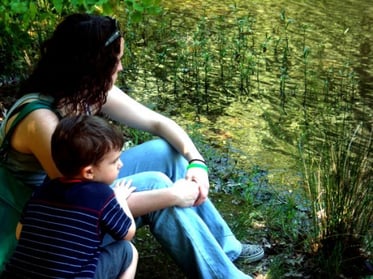 The Best and the Brightest
The Best and the Brightest
Funny how everyone talks about choices for women, but when one of us makes a choice the criticism can be fierce. I remember an episode of the television newsmagazine, 20/20, featuring some of the best and the brightest women in America. These women had quit their jobs and opted to stay home with their small children. They were graduates of Stanford, Yale and Harvard, with high profile jobs in law, finance and business. They were the ones slated to have an impact on the world, to be something great. What on earth were they thinking? The guest on the show, an Ivy League professor, argued, ‘It’s a crime for such women to squander their education and talent caring for their children.’ “It’s wrong,” she insisted, “and I can tell them it’s wrong because I’m a philosopher.”
I couldn’t help but smile as I watched the group of professional women being critiqued by the older professor. They were quiet and unassuming, and looked a little hurt. The professor, a philosopher and also a mother, insisted she had made the “right choice,” that is, to let other, less brilliant stars take care of her daughter. Aside from being amused, I was saddened by her critique. I wondered, “When will women start showing understanding toward other women, instead of being so judgmental?” After all, the philosopher’s logic was that these gifted women should subordinate their family desires to the greater goal of advancing women’s voice and presence in the professional world. Yet, had she considered how distinctly altered that voice would become after they had taken time to parent with full attention? How would it affect them and change their attitudes toward business practices, public policy and legislation, to name a few examples?
As a mother of two school-aged boys myself, I spent a lot of time at home over the last 11 years (though not all). I can say with some certainty, it makes a difference in how I see the world. The decision of professional women to value the art of parenting is a signal that women’s attitudes toward motherhood may be shifting. More women may be taking note of a need to pay greater, not less, attention to our unique role in forming the next generation. This is one of woman’s greatest joys as well as an unparalleled challenge. If we are lucky enough to have the choice to spend some of our children’s’ early years at home, it seems that the best and the brightest make a distinctly counter-cultural decision. They take on motherhood as something not-to-be-missed. This is good news indeed, from where I sit.
The Lord himself said to his disciples, “Let the children come to me and do not hinder them, for to such as these belongs the kingdom of heaven.” Jesus wanted to be near them. When we spend time with our children, they frequently challenge us to examine what we believe about ourselves, the world around us and God. Parenting is a transformative because it not only molds the child, it molds us. It teaches us to see through another’s eyes; it teaches us to live with difference and embrace another person without reserve; it teaches what is at stake in working for a more just world. In other words, the act of mothering teaches us Gospel truths. And when we return to our work outside the family, we will do so with a transformed perspective, a mother’s mind and heart. This may be just the remedy our war-weary, profit-crazy society is longing for.
Copyright 2012 Julie Paavola
About the Author

Guest
We welcome guest contributors who graciously volunteer their writing for our readers. Please support our guest writers by visiting their sites, purchasing their work, and leaving comments to thank them for sharing their gifts here on CatholicMom.com. To inquire about serving as a guest contributor, contact editor@CatholicMom.com.


.png?width=1806&height=731&name=CatholicMom_hcfm_logo1_pos_871c_2728c%20(002).png)
Comments